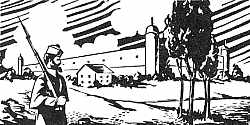|
About this time, the Crimean War between England and Russia broke out and a vicious battle was fought on the little Black Sea peninsula. The British were victorious but the joy at home was short-lived. Reports began to filter back to London of the terrific loss of life - not so much on the battlefield but in the military hospitals. In fact, over 400 out of every thousand in the hospitals were dying. Sidney Herbert, British Secretary at War and friend of the Nightingales, was at a loss as to just what to do until he thought of Florence. And she, in turn, saw this as just the chance for which she had been waiting. So, after carefully collecting a large store of supplies, she arrived at the battlefront in November 1854 with her 38 nurses just after the Battle of Balaklava.  The conditions on her arrival were much blacker than they had been painted in England. As she herself said, "The sanitary conditions of the hospital were inferior to the poorest homes in the worst section of any large city. Often the wounded men were left lying in their fighting clothes." And there was also the red tape that delayed and often prevented getting the simplest of medical supplies. Probably no one woman was ever faced with such a huge and disheartening task. In one hospital alone, the line of wounded stretched almost four miles. |








